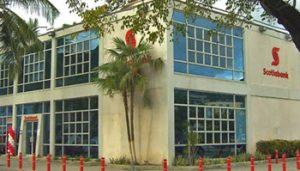British Virgin Islands Offshore Banking

The financial service industry is extremely important for the economy of the British Virgin Islands and accounts for over half of the territory’s income. A majority of the revenue comes from the licensing of offshore companies and related services.
The territory has been designated an offshore financial centre by both the OECD, the IMF and the Financial Secrecy Index.
Since 2001, the financial service sector in the British Virgin Islands is regulated by the Financial Services Commission.
Data from 2012 show that there were six commercial banks in the British Virgin Islands, plus one restricted bank and 12 authorised custodians.
Taxes
 The British Virgin Islands is commonly referred to as a “tax haven” but label is rejected by the British Virgin Islands government, and during recent years, it has actually taken a few steps towards increased information exchange and lowered bank secrecy. After the G8 summit of 2013, the government made various commitments to exchanging tax information and ownership information with foreign governments.
The British Virgin Islands is commonly referred to as a “tax haven” but label is rejected by the British Virgin Islands government, and during recent years, it has actually taken a few steps towards increased information exchange and lowered bank secrecy. After the G8 summit of 2013, the government made various commitments to exchanging tax information and ownership information with foreign governments.
On June 30, 2014, the British Virgin Islands was deemed to have a Model 1 Inter-Governmental Agreement (IGA) with the United States of America with respect to the U.S. Foreign Account Tax Compliance Act.
Still, the British Virgin Islands remain a favourable territory for incorporation due to its low taxes and other beneficial pro-company laws. The U.S. Foreign Account Tax Compliance Act is mainly the concern of U.S. citizens and residents.
Economy of the British Virgin Islands
The British Virgin Islands is one of the most prosperous economies in the Caribbean, having successfully diversified away from its dependence on traditional agriculture since the 1960s. Today, the two main pillars of the economy are tourism and financial services.
Nearly 52% of the Government’s revenue comes directly from license fees for offshore companies. Considerable amounts of money is also raised directly or indirectly from payroll taxes relating to salaries paid within the trust industry.
The tourism industry employs more people than the finance industry, but the average salaries tend to be lower.
About the British Virgin Islands
The British Virgin Islands is a British overseas territory in the Caribbean. Together, the British Virgin Islands, the US Virgin Islands and the Spanish Virgin Islands make up the Virgin Islands archipelago.
The British Virgin Islands consist of four main islands and over 50 smaller islands and cays. Only 15 islands are inhabited. The main islands – Tortola,Virgin Gorda, Anegada and Jost Van Dyke – is home to a majority of the population. Road Town, the capital of the British Virgin Islands, is located on Tortola, which is the largest of the islands.
There is evidence of Amerindians being present in the Virgin Islands archipelago as far back as 1500 BC. Around 100 BC, the archipelago was settled by Arawaks from South America. In the 1400s, the Arawas were displaced by the Caribs who arrived from the Lesser Antilles islands.
During English colonisation, the British Virgin Islands were administered variously as part of the British Leeward Islands or with St. Kitts and Nevis. Separate colony status was given in 1960 and the British Virgin Islands became autonomous in 1967. It is still a British overseas territory and the British monarch is the monarch of the British Virgin Islands.
Citizens of the British Virgin Island do not automatically become UK citizens, but since 2002 they have an entitlement to take up full UK citizenship if they want to.
The British Virgin Islands is not a part of the European Union and not directly subject to EU law.
Short facts
| Status | British Overseas Territory |
| Area | 153 square kilometres |
| Population | 30,900 (2017 estimate) |
| Official language | English |
| Capital | Road Town
(Coordinates: 18°25.883′N 64°37.383′W) |
| Currency | United States Dollar (USD) |
| Time zone | UTC -4 |
| Traffic | Drives on the left |
| Internet TLD | .vg |
Language
The main languages on the British Virgin Islands are Standard English and Virgin Islands Creole. There is also a fairly large population of Spanish-speaking immigrants, chiefly from Puerto Rico and Dominican.
Middle- and upper class British Virgin Island citizens tend to be bilingual and speak both Standard English and Virgin Islands Creole. Standard English dominates the professional sphere, including the offshore banking sphere.
Currency
In 1959, the British Virgin Islands adopted the United States Dollar (USD) as its official currency. This is the same currency as the one used in the US Virgin Islands, located just a few miles west of the British Virgin Islands.
This article was last updated on: April 3, 2025
